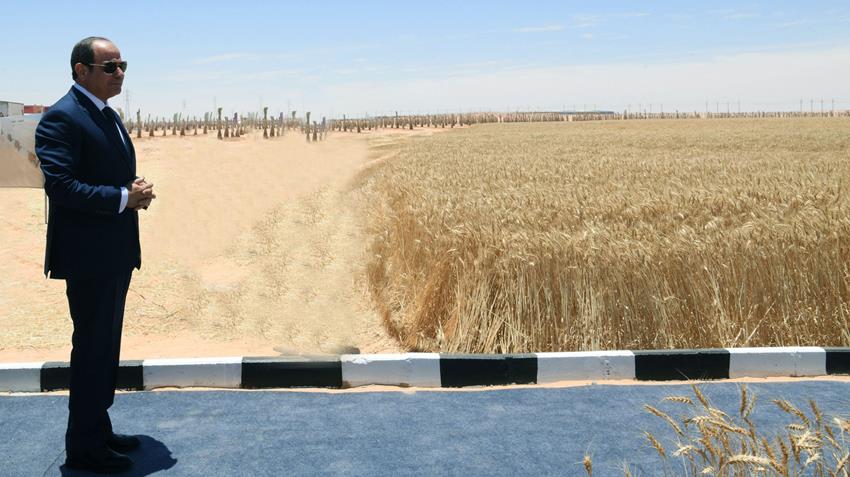Egypt aims to procure 3.5 million tons of local wheat during the 2024 season, as announced by Ali Al-Moselhy, the country’s minister for Supply and Internal Trade. This initiative precedes the wheat harvest in Egypt, which typically commences in April and spans several months.
The government’s objective is to bolster self-sufficiency in wheat and corn crops. Minister of Planning, Hala Al-Saeed, stated that the goal is to raise wheat production to 53 percent from 45 percent in 2021 and corn production to 56 percent by 2025/2026.
Since November 2023, Egypt has planted three million feddans of wheat, representing a year-on-year increase of nearly half a million acres, according to the cabinet’s announcement in January 2024.
Assistant Supply Minister Ibrahim Ashmawy informed Bloomberg that Egypt’s wheat imports rose by 14.5 percent to 11 million tons in 2023 compared to 9.6 million tons in 2022.
A 2022 report by the United States Department of Agriculture shows how Egypt consistently imported around 12 million metric tons of wheat annually from 2017 to 2021.
As the third-largest economy in the Arab world, Egypt is often the world’s leading wheat importer, relying on foreign sources for over 50 percent of its wheat requirements. Its annual wheat consumption stands at 18 million tons, with the shortfall between imports and consumption met through local production.
In November, the Egyptian Cabinet raised the local wheat procurement price to EGP 1,600 (USD 33.7) per ardeb (150kg) from EGP 1,500 for the upcoming harvest season, aiming to incentivize farmers to sell to the state.
During the previous harvest season, running from April 1 to August 31, the government purchased 3.8 million tons of wheat from local farmers.
The ongoing conflict between Russia and Ukraine, key wheat suppliers to Egypt, has triggered a global surge in wheat prices, exacerbating Egypt’s substantial import bill. Wheat holds crucial importance in Egypt, where approximately 70 million out of 104 million people rely on state-subsidized bread for sustenance.
Last year, Abu Dhabi-based agribusiness company Al Dahra and the Abu Dhabi Exports Office (Adex) secured a USD 500 million (EGP 23 billion) multiyear deal to provide Egypt with wheat. The five-year agreement, amounting to USD 100 million (EGP 4.7 billion) annually, commenced supplying Egypt with imported milling wheat last year.
Egypt’s economy has grappled with numerous challenges in recent years, including rising inflation, foreign exchange shortages, and high debt levels.
In February, business activity in the country’s non-oil private sector contracted sharply, attributed to a deepening foreign exchange crisis and a significant decline in customer sales, as reported by S&P Global on March 5.
The disruption in Red Sea shipping due to attacks by Yemen’s Houthi rebels has significantly impacted Egypt, leading to a roughly 50 percent decrease in key Suez Canal revenue in 2024 so far, according to the ratings agency.
On a positive note, Egypt’s agricultural exports surged to USD 1.5 billion (EGP 71 billion) in the first quarter of 2024, marking a USD 300 million (EGP 14 billion) increase compared to the same period last year, according to Al-Sayed Al-Kosayer, Minister of Agriculture and Land Reclamation. Despite global and regional challenges affecting supply chains, agricultural exports exceeded 2.2 million tons, with Egypt now exporting over 400 agricultural commodities to 160 countries. In 2023, Egypt’s fresh and processed agricultural product exports amounted to approximately USD 9 billion (EGP 426 billion).
Additionally, the International Monetary Fund (IMF) approved an USD 8 billion (EGP 379 billion) loan package for Egypt, aimed at revitalizing the country’s faltering economy, which has been further affected by the Israel-Gaza conflict. This new program supplements the existing USD 3 billion (EGP 142 billion) 46-month Extended Fund Facility signed in December 2022, allowing Egypt immediate access to USD 820 million (EGP 38 billion).
The IMF expanded the agreement in response to Egypt’s economic challenges exacerbated by the Gaza crisis, which slowed tourism growth and disrupted shipping in the Red Sea, resulting in a significant drop in Suez Canal revenue. Tourism and shipping are vital sources of foreign exchange for Egypt.
The expanded loan agreement was announced on March 6, following the Central Bank of Egypt’s decision to increase interest rates and allow the local currency to float freely without state intervention. Cairo had previously received a first tranche of USD 347 million (EGP 16.4 billion) after signing the December 2022 deal.






Comments (0)